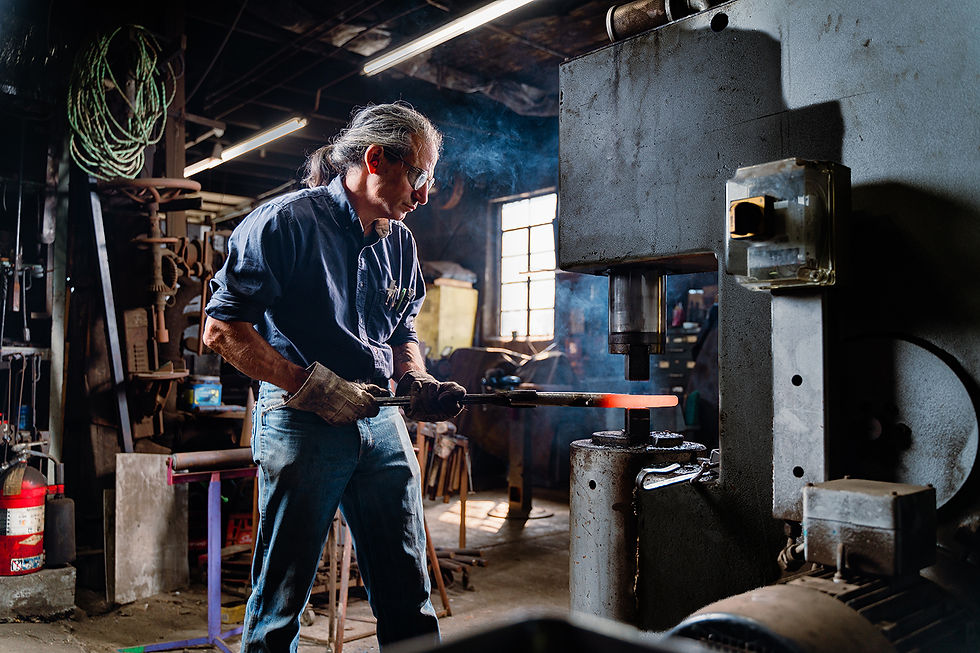Falls City Ironworks
- Information VOICE_TRIBUNE
- Nov 2, 2024
- 4 min read
By RUSS BROWN • Photos by Matt Johnson

Most people’s idea of a blacksmith over the years was probably formed by Western movies that contained scenes of a livery stable with a blacksmith shoeing a horse or pounding a horseshoe into shape on an anvil. Blacksmithing tools and workplaces are different from those of historical blacksmiths with welding guns, electric grinders and other modern instruments having replaced or supplemented the hammer, anvil and chisel. Blacksmiths are incorporating more machinery into their craft and infusing it with technology and knowledge.
Blacksmithing, which can be traced to ancient times, has been experiencing a modern revival for at least several decades due in part to interest in traditional art forms, historical restoration and demand from homeowners and hobbyists.
And perhaps no better example of fusing the present with the past can be found than Falls City Ironworks owned by blacksmith Lewis Meyer, a 33-year practicing veteran of the craft.
Meyer, 55, works out of the old Fred Hutt Blacksmith Shop at 853 South 7th Street in Louisville, having purchased the building from Hutt in 2000. Hutt’s grandfather, Jacob Hutt, emigrated from Germany in the 1800s and eventually started the business. The building is the oldest continuously-functioning blacksmith shop in Louisville and maybe the U.S.
“Fred told me he had a copy of a deed from 1852, but I haven’t made it to the deeds office to confirm,” Meyer said. “The shop is in the old city directories back into the early 1860s, which is as far as they go. They show John Smith and his sons working as blacksmiths there before the Hutts. I’ve found a few tools in the shop stamped ‘J Smith’, so they presumably predate Jacob Hutt’s ownership in 1895.”

“The building was clearly built for blacksmithing and wagon work and has been used for such its entire existence. The Hutt family kept the business going through the 20th century, when most other shops closed, by doing various tool-making and sharpening work and being one of the few businesses in the area to install trailer hitches. They probably sharpened thousands of jackhammer bits when the expressways were being built in the area.”
Meyer said he isn’t aware of any other blacksmith shops in the country that have been in continuous operation since the 19th century. He believes there are older shops, and some of them may even be used for blacksmithing again, but none have been a working shop the entire time.

Meyer, a native of State College, Pa. where his parents taught at Penn State University, received a BA from Vassar College in Poughkeepsie, N.Y. in 1991 and moved to Louisville where he worked in construction and also for blacksmith Craig Kaviar. He moved to Memphis in 1994 and did an apprenticeship in the blacksmith shop of the National Ornamental Metal Museum. Afterwards, he became an assistant in the Iron Studio at Penland School of Crafts and worked with other blacksmiths in Memphis. In 1997. He moved back to Louisville and opened Falls City Ironworks, originally located in Jeffersonville, Ind.
So how did a graduate of Vassar become interested in blacksmithing?
“After graduation with no idea what to do for an actual job, I was visiting a renaissance fair in upstate New York and I saw the blacksmith there and thought, ‘I did that for three hours in high school. That would be a cool job.’ A month or so later I was visiting my father, who now taught at the University of Louisville, and I looked in the paper to see what the job opportunities were and there was an ad for an apprentice blacksmith. I started working for Craig later that week.”

Meyer says blacksmithing has been growing since the hippie craft revival in the seventies.
“There are far more opportunities to learn and much easier access to tools and materials than there was when I started 30 years ago,” he said. “It’s really taken off in the last decade with the popularity of (reality TV series) ‘Forged in Fire.’”
As for his own business, Meyer says he mainly focuses on forged steel work -- metal crafts focusing on making and repairing of objects from basic metals such as iron, steel, copper, brass, tin, gold, silver and pewter.
“Get it hot, hit it with a hammer, making all the parts myself,” he said. “As a solo operator I mostly do furniture size or smaller projects. I’ve made tables, fireplace screens and tools, curtain rods, light fixtures and other household objects.”

He also makes garden tools and kitchen utensils for his personal use, as well as some gates and railings and repairs to the main gate and public vault door at Eastern Cemetery.
In addition to the traditional hammers and anvil, he also uses a pneumatic power-hammer, a hydraulic press, a coal forge variety of tongs for holding hot metal, various other machines, two coal forges that are original to the building, a gas forge that runs on propane, a number of vises and several racks full of tools that only another blacksmith would recognize. Visitors to his shop will also see and hear Meyers’ constant companion -- a scruffy, gray tabby cat he says “meows a lot.”
Similar businesses in the Louisville area include Kaviar Forge, which offers group lessons; Iron Touch Forge, specializing in wrought iron and non-ferrous metals Sculptural and Architectural Blacksmithing; Gianni Zanata, and Maynard Studios in Lawrenceburg.

Comments